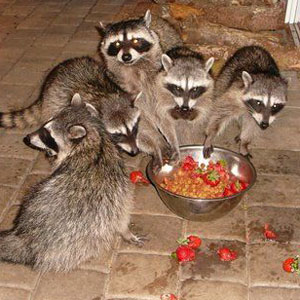Stop Providing Food for Local Wildlife
By Chris Williams on October 15, 2013.

Question
We’ve had a problem with raccoons for years. We’ve trapped and removed several of them, but in a matter of months we have raccoons again. Do you think it’s the same raccoons returning or are they new ones? And why do they like our yard so much?
Answer
I doubt if it’s the same raccoons, but that may depend on how far away they are being released. It’s more likely that new raccoons are moving in to fill the void because your yard is, as you already know, a desirable place for raccoons. You need to figure out why.
We refer to raccoons and other animals like squirrels or bats as nuisance wildlife…when they’re where we don’t want them to be. Like other pests, nuisance wildlife look for food, water, and shelter. If raccoons or other animals have become pests around a property, we can assume that they are finding at least one, and probably all three, of these needs on that property.
Trapping and removing wildlife is an important first step, but if conditions at the site don’t change, pest animals will return. If you can eliminate or change available food, water, or shelter, the site becomes less desirable for the pest animals. This approach to nuisance wildlife control is known as habitat modification and it can be used alone or as part of a more comprehensive animal control/removal program.
You need to know the feeding and denning or nesting habits of the animal causing the problem so that you can track its movements on the property and determine what needs to be changed. At Colonial, our animal control technicians do just that. We have trained technicians that specialize in nuisance wildlife control. They are licensed in humane animal trapping and can advise customers on steps to take to make their property animal-proof.
“Home” is Where They Feed You!
Some habitat modifications can be labor intensive, but others are quite simple. A good start would be to eliminate non-natural food sources in your yard that might be attracting raccoons and other animals.
1) Manage your garbage
Animal-proof your garbage cans by using secure lids, attaching cans to a post, or keeping containers indoors or in a protected location. Don’t leave trash out all night. Put garbage cans out right before they are to be collected in the morning. Clean and repair garbage cans often.
2) Secure pet food and bird seed
Feed pets indoors. Any pet food left outdoors should be brought in overnight. Use bird feeders that have a seed catch tray beneath and install them on sturdy, non-climbable poles or use a guard below the feeder. Clean up excess seed on the ground frequently. Store pet food and bird seed in strong containers in protected areas.
3) Clean up your yard
Clean up fruits and vegetables that end up on the ground. Rake up and remove nuts that fall from trees. Remove pet feces daily (other animals do eat this). Eliminate pools of standing water and empty containers holding rainwater.
Photo credit: alasam / Foter / CC BY-NC-ND